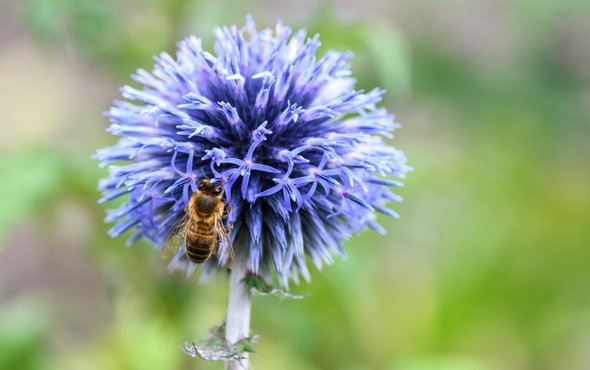(单词翻译:单击)
听力文本
This is Scientific American — 60-Second Science. I'm Jason Goldman.
Add up every golf course, athletic field, industrial park, and yard in the U.S. and you have an area nearly the size of Florida. Upon first glance, all that lawn might seem a biological wasteland—a monoculture of grass.
But while natural areas in the U.S. continue to decrease thanks to urbanization, urban green spaces—including lawns—could become more important reservoirs of biodiversity.
"What happens if we mow our lawns less? Do we get more lawn flowers? And if we get more lawn flowers, can we get more bees?"
U.S. Forest Service ecologist Susannah B. Lerman.
She and her colleagues devised an experiment to see if front lawns could in theory provide decent habitat for bees – and if so, how to do it. So they recruited 16 homeowners from a Massachusetts suburb and monitored for flowers and bees throughout the summer for two years. Each of the homeowners agreed not to use any kind of pesticide or herbicide. And none had cultivated any sort of pollinator or vegetable garden that could skew the results. Some of the lawns were mowed weekly, some every other week, and others were mowed every three weeks.

"When we mowed the lawns less, we got more flowers, roughly two and a half times more. But it was those that we mowed every two weeks that had the most bees."
No surprise, flowers were most abundant on the lawns mowed least often. But why do bees like a bit more frequent mowing? Lerman thinks that's because most of the bees she found were tiny native sweat bees, roughly the size of a grain of rice. Critters that small could find it difficult to navigate through the taller grasses.
In all the researchers found 111 types of bees over the course of the study. That represents a quarter of all bee species known to occur in Massachusetts.
"When you get down on your hands and knees, there's a lot going on in these lawns."
So not only do lawns hold more biodiversity than it might seem, but it turns out that one way to manage them for wildlife is to be lazy—but not too lazy.
"A lot of people have been telling me that they feel vindicated now. That they have a realize to tell their neighbors why they're not mowing, it's for the bees...By mowing your lawns every two weeks or so, you're letting these flowers grow and bloom and they seem to be having a positive impact for bees."
For Scientific American — 60-Second Science. I'm Jason Goldman.
参考译文
这里是科学美国人——60秒科学。我是杰森·古德曼。
把美国所有高尔夫球场、运动场、工业园区和庭院加起来,面积几乎和佛罗里达州一样大。乍一看,所有这些草坪可能看起来很像是生物学意义上的荒地——只有草地。
但是,当美国自然区域的面积因城市化而不断减少时,包括草坪在内的城市绿地可能成为更重要的生物多样性贮藏所。
“如果我们减少修剪草坪的次数会怎么样?草坪上会开出更多花吗?如果草坪上的花多了,那会吸引来更多蜜蜂吗?”
美国林务局的生态学家苏珊娜·B·勒曼说到。
她和同事设计了一个实验,观察前院草坪在理论上是否能为蜜蜂提供合适的栖息地——如果可以,那草坪是如何做到的。因此,他们从马萨诸塞州郊区招募了16名房主,并对他们草坪上的花朵和蜜蜂进行了两个夏天的监测。16位房主均同意不使用任何杀虫剂或除草剂。而且他们也不会耕作任何花园或菜园,以免影响实验结果的准确性。有些草坪每周修剪一次,有些每两周修剪一次,其他草坪则每三周修剪一次。
“修剪次数少的草坪,开花更多,数量大约增加了2.5倍。而每隔两周修剪一次的草坪吸引的蜜蜂最多。”
修剪次数最少的草坪开花最多,这点并不意外。但是为什么蜜蜂喜欢修剪频率较高的草坪呢?勒曼认为,这是因为她发现的大部分蜜蜂是体型较小的本土汗蜂,这种蜜蜂的大小和一粒米差不多。这种小生物可能很难在较高的草坪中辨别方向。
在整个研究过程中,研究人员发现了111种蜜蜂。这代表了马萨诸塞州出现的所有已知蜜蜂品种的四分之一。
“当你趴在地下观察时,会发现草坪里有很多生物。”
因此,不仅草坪比预想中拥有更多的生物多样性,而且事实证明为野生动物管理草坪的其中一个方法是“懒”——但是也不要太懒。
“很多人告诉我现在他们觉得自己的想法得到了证实。他们意识到要告诉邻居,为什么他们不修剪草坪,这是为了蜜蜂……每两周左右修剪一次草坪,会让花朵生长开花,而这看起来对蜜蜂有积极影响。”
谢谢大家收听科学美国人——60秒科学。我是杰森·古德曼。
译文为可可英语翻译,未经授权请勿转载!
重点讲解
重点讲解:
1. add up 加;
Add up the figures in this column.
把这一栏的数字合计一下。
2. thanks to 幸亏;归因于;
Thanks to the angle at which he stood, he could just see the sunset.
由于站的位置视角好,他刚好能看见日落。
3. in theory 从理论上说;照理说;
In theory, the buyer could ask the seller to have a test carried out.
理论上,买方可以要求卖方进行一次测试。
4. get down 俯身;跪下;趴下;
She got down on her hands and knees on the floor.
她双手撑地跪在地上。


